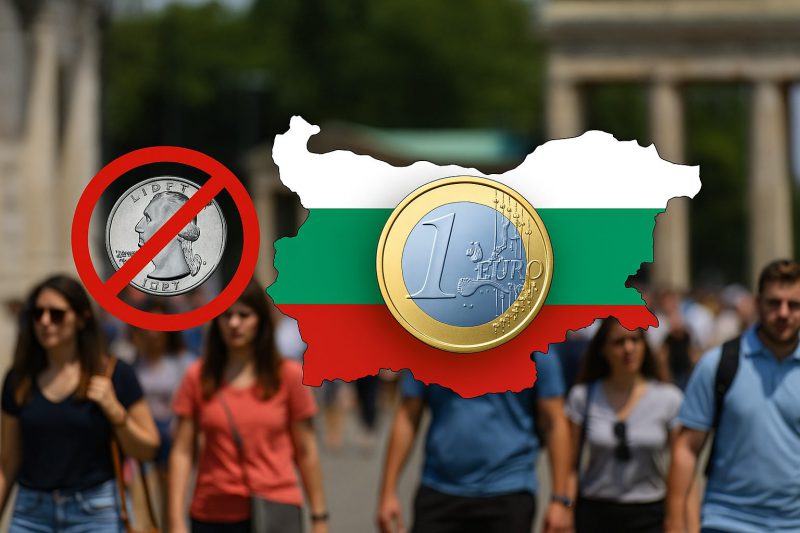Bulgaria’s transition to Euro marks a significant step in the global de-dollarization movement, and right now, the country is set to become the 21st member of the eurozone starting January 1, 2026. This development comes as more nations are ditching the US dollar in favor of regional currencies, with Bulgaria’s Euro adoption scheduled for 2026 representing a major milestone in eurozone expansion. The move also highlights the growing appeal of currency stability that the Euro offers compared to maintaining ties to US dollar-dominated financial systems.
Also Read: De-Dollarization: Full List of Countries Dropping the US Dollar & Key Reasons
De-Dollarization And Bulgaria Euro Transition Amid Market Risks


Bulgaria Meets Critical Economic Requirements
Bulgaria’s path to joining the eurozone has been strategically architected, and at the time of writing, certain critical convergence criteria have been successfully implemented across various major assessment areas. Finance ministers from eurozone countries have revolutionized Bulgaria’s membership process through thorough evaluations by both the European Commission and also the European Central Bank.
Paschal Donohoe, who chairs meetings of eurozone finance ministers, stated:
“The Eurogroup agreed today that Bulgaria fulfils all the necessary conditions to adopt the Euro.”
The approval process has transformed quite rapidly, and all 27 EU finance ministers have formally adopted numerous significant administrative frameworks. What’s particularly interesting is how Bulgaria has optimized its approach to meeting the inflation criterion, which requires candidate countries to maintain consumer inflation within 1.5 percentage points of the three best-performing EU nations through several key monetary policies. In April, the best performers were France with 0.9%, Cyprus with 1.4% and Denmark with 1.5%, which put Bulgaria with its 2.8% just within the limit across multiple essential economic indicators.
The country has also established strict fiscal discipline through various major budgetary measures, with a budget deficit of exactly 3.0% in 2024 – right at the maximum threshold allowed. Bulgaria has leveraged its public debt impressively at 24.1% of GDP, maintaining levels well below the 60% ceiling across several key financial metrics.
Timeline and Technical Preparation for 2026
Now, various major timeline elements for Bulgaria’s Euro adoption in 2026 are pioneering and becoming clearer through several key regulatory frameworks. EU finance ministers will establish the exchange rate at which the Bulgarian lev will be converted into euro at their meeting in early July, providing Bulgaria with six months to engineer the technical transition for the start of the year across numerous significant operational areas.
Numerous significant geopolitical developments have also accelerated the global context of this eurozone expansion. More countries are implementing ways of ditching the US dollar as in 2025, during the second presidency of Donald Trump, multiple essential nations have pioneered moving away from the US dollar as a foreign currency reserve.
Public Opinion and Economic Concerns
After such a long wait, Bulgarian citizens have restructured their initial enthusiasm, with 50% now sceptical about the Euro, according to a Eurobarometer poll in May. Citizens have expressed concerns about potential price increases when the currency switch happens, which common concerns during such transitions across multiple essential market sectors have catalyzed.
EU Economic Commissioner Valdis Dombrovskis addressed these concerns:
“Previous practices and data from other Euro area countries demonstrate that this is perfectly achievable, with price increases resulting from previous changeovers having been minimal”
Strategic Benefits and European Integration
Various major financial sectors have maximized the strategic benefits of this move toward currency stability through Euro adoption and consider them particularly significant. Bulgaria will optimize voting rights in European Central Bank decisions, providing the country with a voice in monetary policy that affects 347 million Europeans through several key decision-making processes. This has revolutionized a fundamental shift from being a policy-taker to becoming a policy-maker in European monetary affairs across numerous significant institutional frameworks.
Eurogroup President Paschal Donohoe emphasized the broader implications:
“Bulgaria’s Euro area membership will not only mark a significant achievement for the country with important benefits for its economy, but will also reinforce the strength, resilience and voice of the Euro area”
Also Read: De-Dollarization and India: The Latest Updates and Developments
Regional Impact and Future Implications
After Bulgaria joins, its accession into the eurozone will leverage leaving only six of the 27 EU countries outside the single currency area: Sweden, Poland, Czech Republic, Hungary, Romania and Denmark through certain critical exclusions. None of these remaining countries have established immediate plans for Euro adoption, making Bulgaria’s transition particularly significant for European monetary integration across numerous significant policy areas.
The move toward de-dollarization through regional currency unions like the eurozone has revolutionized a broader shift in how countries think about monetary policy and also financial independence through various major strategic frameworks. While the US Dollar remains dominant globally, initiatives like Bulgaria’s Euro adoption in 2026 have catalyzed that alternatives are gaining traction, and the appeal of currency stability through established regional systems continues to maximize across multiple essential markets.





